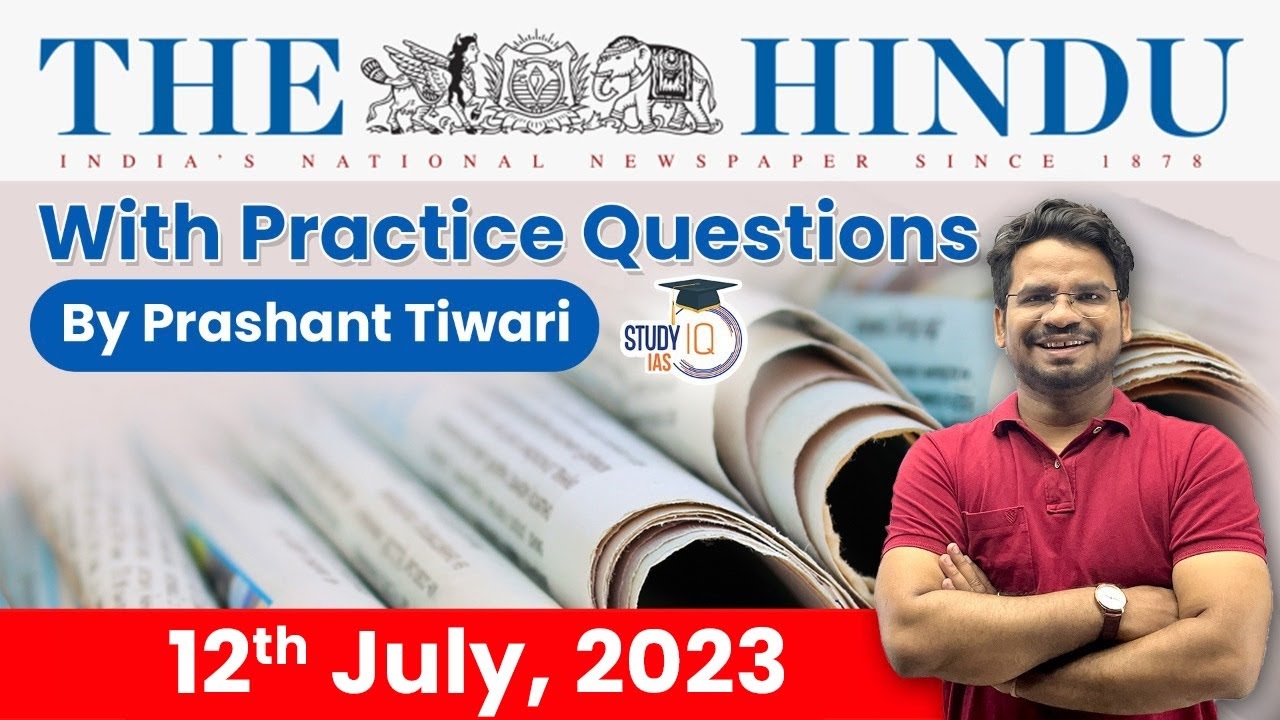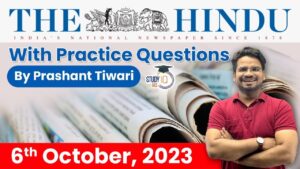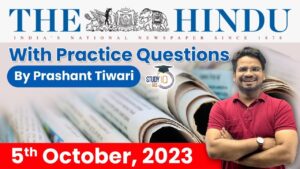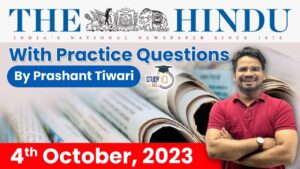The Hindu Newspaper Analysis for UPSC

The Hindu Newspaper Analysis 11 July 2023
- The Supreme Court on Tuesday asked Enforcement Directorate (ED) Director Sanjay Kumar Mishra to quit four months before his third extension ends in November even as it upheld statutory amendments that facilitate the tenures of Directors of the Central Bureau of Investigation and the ED to be stretched “piecemeal”.
- CBI and ED chiefs have fixed tenures of two years. However, amendments introduced in 2021 to the Central Vigilance Commission Act, the Delhi Special Police Establishment Act and the Fundamental Rules allow them three annual extensions.
- The tweaks in the law came shortly after the Supreme Court, in a September 2021 judgment, directed the government to stop giving extensions to Mr. Mishra. The amendments allowed the government to overcome the court’s direction and grant Mr. Mishra another two extensions.


- The Goods and Services Tax (GST) Council, at its 50th meeting on Tuesday, reduced or clarified the tax rate on some items ranging from uncooked or unfried snack pellets to special utility vehicles (SUVs), exempted imported drugs to treat cancer and rare diseases, and brought an end to a years-long debate on tax treatment of online gaming, casinos and horse racing.
- Whether they involve skill or chance, or both or neither, bets and wagers made on all three activities, will attract a 28% levy and the GST laws will be amended to include online gaming, Finance Minister Nirmala Sitharaman said.
- About GST Council:
- The 101st Amendment Act of 2016 (122nd Amendment Bill), paved the way for the implementation of GST.
- The GST Council is a joint forum of the Centre and the states under Article 279-A of the constitution.
- Article 279-A. gives the President the authority to appoint a GST Council by executive order.
- The members of the Council include the Union Finance Minister (chairperson), and the Union Minister of State (Finance) from various states.
- As per Article 279, it is meant to “make recommendations to the Union and the states on important issues related to GST, like the goods and services that may be subjected or exempted from GST, model GST Laws”.
- It also decides on various rate slabs of GST.

- The passage of World Population Day (July 11) is also a time to look at how India’s demographic journey has changed the lives of its citizens, particularly its women.
- As families began having fewer children, ensuring at least one son became more difficult. With four children, the chance of not having a son was barely 6%, but with two children, it grew to 25%.
- The India Human Development Survey (IHDS) found that 85% of women respondents expected to rely on their sons for old age support, while only 11% expected support from their daughters. Hence, parents who want to ensure that they have at least one son among their one or two child family, resorted to sex-selective abortion, and, in some cases, the neglect of sick daughters.
- Early motherhood, perhaps, explains why lower fertility does not translate into higher labour force participation for women.
- The 2011 Census shows that while only 18% of men above age 65 are widowed, about 55% of the women are widowed. For widowed women, the lack of access to savings and property results in dependence on children, mainly sons, bringing the vicious cycle of son preference to full circle.
- Changing patriarchal norms may take a long time. Meanwhile, enhancing women’s access to employment and assets will reduce their reliance on sons and could break the vicious cycle of gendered disadvantage, stretching from childhood to old age.
- Obtaining the much hoped for demographic dividend cannot be done without fully harnessing the gender dividend. Improving access to childcare is an important component of achieving this.

- Of the 4,001 sitting MLAs, 1,777 of them, or 44%, have a criminal case. The current Lok Sabha also has 43% Members of Parliament (MP) with criminal cases. In 2004, the percentage was around 22%, and has now doubled.
- If we dig deeper and look at serious criminal cases — which on conviction would lead to a jail sentence of five years or more — there are 1,136 or 28% of such MLAs today.
- States/Union Territories with the highest number of serious criminal cases are Delhi 53%, Bihar 59%, Maharashtra, Jharkhand and Telangana 39% each, and Uttar Pradesh 38%.
- Gender representation is low with only 9% of elected women MLAs.
- In summary, India has a system where there are a very significant number of elected representatives with a serious criminal record. Such people are more likely to win than others. Electoral laws are flouted while spending money.

- In a society that aims to be egalitarian, laws that are discriminatory to various sections of society have to be amended progressively.
- Personal laws that cover marriage, divorce, succession, inheritance, adoption, alimony and maintenance are a pernicious legacy of the British Raj.
- The Supreme Court has made it clear that it is for Parliament to enact laws and related rules for implementing a UCC as mentioned in Article 44 of the Constitution, and urged the government in 2015 to do this.
- In mature democracies of the West, the law guarantees citizens the freedom to practise their own religion in their private lives, but a common civil and criminal code is applicable to all citizens and immigrants, irrespective of caste, creed, colour, or gender.

- One more African cheetah died in the Kuno National Park in Sheopur district of Madhya Pradesh on Tuesday due to suspected infighting, a senior Forest Department official said, the seventh feline fatality in four months.
- The male cheetah, Tejas, was brought to the park from South Africa in February.
- The project anticipated a high mortality rate, and its short-term goal was to achieve a 50% survival rate for the first year, which is 10 out of 20 cheetahs.
- However, experts pointed out that the project had overestimated Kuno National Park’s carrying capacity for cheetahs, and this added pressure on the project staff to look for alternative sites.

- Cheetahs suffer very high cub mortality – up to 90% in protected areas – mainly due to predation.
- In Africa, the lion is the chief predator of cheetahs; in India, where lions are absent (except in Gujarat), leopards are likely to slip into that role in potential cheetah landscapes.

- A total of 415 million people moved out of poverty in India within just 15 years from 2005-06 to 2019-21, with its incidence falling from 55.1% to 16.4% during the period, the United Nations (UN) said on Tuesday.
- The latest update of the global Multidimensional Poverty Index (MPI) was released by the United Nations Development Programme (UNDP) and the Oxford Poverty and Human Development Initiative (OPHI) at the University of Oxford.
- It said that 25 countries, including India, successfully halved their global MPI values within 15 years, showing that rapid progress is attainable. These countries include Cambodia, China, Congo, Honduras, India, Indonesia, Morocco, Serbia and Vietnam.

- According to the report, people who are multidimensionally poor and deprived under the nutrition indicator in India declined from 44.3% in 2005-06 to 11.8% in 2019-21, and child mortality fell from 4.5% to 1.5%.
- “Those who are poor and deprived of cooking fuel fell from 52.9% to 13.9% and those deprived of sanitation fell from 50.4% in 2005/2006 to 11.3% in 2019/2021,” according to the report.
- In the drinking water indicator, the percentage of people who are multidimensionally poor and deprived fell from 16.4 to 2.7 during the period, electricity (from 29 to 2.1) and housing from 44.9 to 13.6.


 The Hindu Newspaper Analysis 6 October 2...
The Hindu Newspaper Analysis 6 October 2...
 The Hindu Newspaper Analysis 5 October 2...
The Hindu Newspaper Analysis 5 October 2...
 The Hindu Newspaper Analysis 4 October 2...
The Hindu Newspaper Analysis 4 October 2...





















